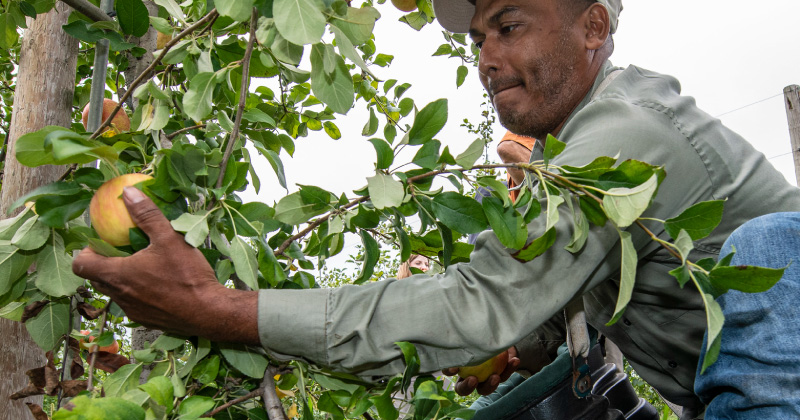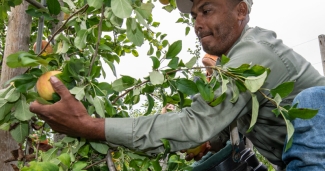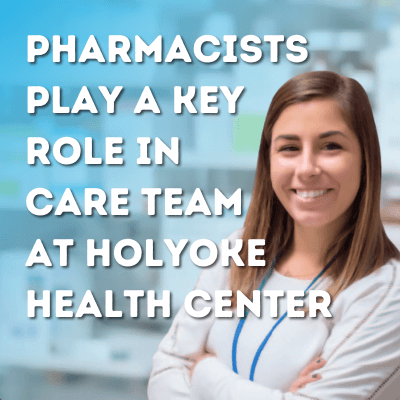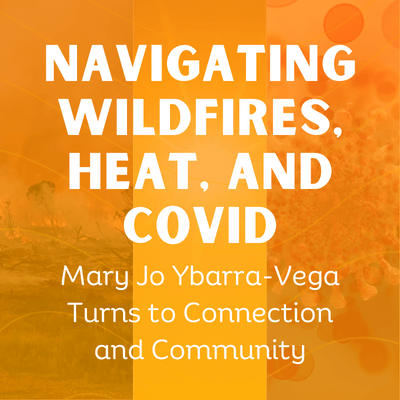Planning, Partnerships, and Perseverance: Overcoming Challenges on the COVID-19 Frontlines

In 2020, while COVID-19 outbreaks were already hitting farms further south, Maine's late harvest window provided clinicians and public health workers a longer lead time to prepare and advocate for migrant farmworkers, before they arrived.
“We started preparing very early, collaborating with the Department of Agriculture, the Department of Health and Human Services [Maine DHHS], and the Maine Centers for Disease Control and Prevention [an office within the Maine DHHS, abbreviated for this article as Maine CDC-DHHS], which is our public health department, trying to bring awareness to the fact that farmworkers were coming, and they were going to need to be part of the COVID testing availability, come spring,” explained Lisa Tapert, MPH, Chief Executive Officer of Maine Mobile Health Program, Inc. (MMHP), Maine's all-migrant and seasonal agricultural worker health center. During the harvest season, MMHP's 15 full-time regular staff operate four mobile medical units to serve between 1,100 and 1,500 farmworkers, at blueberry, Christmas tree, apple, dairy, egg, and vegetable farms around the state.
MMHP's collaboration with the state of Maine led to identifying migrant and seasonal farmworkers as a priority group for on-arrival testing, before they entered housing on the farms.
These valuable extra days were instrumental in successfully maintaining the health of migrant workers and those they might encounter. MMHP pushed Maine DHHS to bring attention to the needs of vulnerable populations, which responded with new resources and wrap-around services for workers in unstable housing . MMHP expanded the collaborations further to garner housing, supplies, food for workers staying at hotels, and other resources for the testing, quarantining, and isolation of workers. “Putting that all together was just a massive multi-organization undertaking for a small number of people, really,” Tapert explained. “None of it could we have done alone…it just wouldn’t have been possible.”
Many Hands Make Lighter Work
MMHP’s work covers the entire state of Maine, making connecting with partners for active engagement in the community even more difficult. However, MMHP was able to orchestrate partnerships to help keep farmworkers and the community safe.
Planning with Maine’s Health Department
Early on, MMHP collaborated on creating a document on seasonal and migrant farmworker safety, modified from another state’s document, with Maine CDC-DHHS, the Department of Agriculture, and the Department of Labor. Tapert noted that there was work to be done to educate health department officials about the needs of farmworkers. Zoom meetings offered an opportunity to engage with health department officials in ways they had not been able to in the past. Zoom allowed MMHP to network with individuals they would not normally be able to reach through Zoom’s private chat, to advocate for farmworkers and educate Maine DHHS on migrant workers’ unique needs. “The health department ended up seeing us as a resource ,” as a result, she said.
During the pandemic, Maine DHHS handed over some critical roles to MMHP. Maine DHHS lent MMHP needed equipment such as COVID-19 test kits, testing machines, and other supplies. MMHP and partners handled tasks related to positive farmworker cases, including contact tracing and quarantine/isolation. Maine CDC-DHHS defined outbreaks as three or more cases in a factory setting , allowing the Maine CDC-DHHS to focus on other COVID-19 related cases and outbreaks throughout the state. With their long-established trust with the migrant workers, deep knowledge on the farmworker population and language skills, MMHP could contact trace workers more easily than Maine CDC-DHHS. As MMHP tested workers they kept track of close contacts so that a person who was COVID-19 positive and their travel partners could be effectively quarantined and isolated. MMHP’s efficiency (often being aware of a positive case 20 minutes after testing their patients) limited the need for significant Maine CDC-DHHS involvement. Maine CDC-DHHS "has been really gracious about recognizing our expertise and saying, ‘you tell us what you need, and we'll do that,’” Tapert said.
Farm Owner Partnerships: From Necessity Comes Collaboration
Tapert explained that the second “phase” of preparing for migrant workers’ arrival to Maine was to work directly with farm owners, reaching out to them to understand their feelings on COVID-19 testing and their level of willingness to collaborate with MMHP to offer testing to migrant workers when they arrived in Maine, as well as their feelings about other best practices. “This was a year where we really, really, worked closely” with farm owners, said Tapert.
Tapert noted that many farm owners reached out to MMHP to seek help rather than the usual method of MMHP reaching out to farm owners -- a new phenomenon related to the era of COVID-19. She believed this came from the publicity driven by MMHP’s participation in webinars at the beginning of the pandemic, and repetitive messages about COVID-19 testing resources for farm owners, such as MMHP’s ability to test uninsured workers for free. Tapert recollected that she believes she spoke to 50-60 farm owners she had never spoken to before. “I’ve wanted to have these relationships, but I never could figure out how to do it,” she explained.
Not only did MMHP provide farm owners with access to free testing, but MMHP was an informational resource to farm owners about COVID-19 best practices during a time when they were needing help. “I think the biggest benefit that we offered farm owners is that they could call us and ask us questions about what they should do,” Tapert said, adding that her team spent hours discussing quarantining, isolation, and testing with employers. “Some of them were, amazingly, amazing collaborators… And some weren’t. But I found that during this period when they really needed medical help, they were very grateful to have somebody reaching out to them.” MMHP was also able to learn from the farm owners they worked with. “They helped us also have a much better understanding of their businesses and their labor practices,” she explained.
Frequent, open communication led to enhanced collaboration. “I was able to say, ‘well this farm owner agreed to pay sick pay, so you should agree to pay sick pay.’ And that worked really well,” explained Tapert. She was also able to discuss funding options for housing, food, and sick pay with farm owners, available tax credits from state and federal sources, and partner funds to offset housing expenses. With these resources, many companies had nearly no net loss while helping to support their workers. MMHP’s relationships with employers allowed for Tapert to persuade some who had to operate at a loss to pay their workers regardless. As MMHP shifts to vaccination strategies, Tapert says their stronger relationships with farm owners have already led to fruitful conversations about the best ways to provide workers with vaccination.
Maine Housing Authority and Local Hotels: The Brick and Mortar of COVID-19 Testing Strategy
Another crucial partnership Tapert discussed was MMHP’s collaboration with the Maine State Housing Authority and local hotels. MMHP needed housing for workers waiting for results and undergoing recovery or quarantine, if they had traveled with a worker who tested positive. MMHP worked with Maine State Housing Authority to identify local hotels that had more rooms than usual due to COVID-19. Maine State Housing executed contracts with hotel owners to host workers. Some hotels were designated for workers waiting to be tested, and others to host sick workers. MMHP also developed protocols for workers who tested positive and stayed at hotels, something she explained was a complicated process. “We couldn’t have done it without the hotels. That was the most important aspect,” she said.
Managing Outbreaks Through Prevention: Testing and Immediate COVID-19 Care, Best Practices in Action
With federal funding, MMHP was able to expand testing to 1,600 workers by December, more workers than they typically serve in a year. Tapert felt that the state’s commitment to testing led to circumstances that “far outpaced what’s available in a lot of other places.” The state lab was available to process COVID-19 tests and provided free testing, materials, and PCR test results within a couple of days.
MMHP’s testing routine was enhanced through the use of three Abbott ID Now Rapid test machines, allowing them to test 75 people in a day, the best method for them to use to separate workers before they were housed. For groups already in housing, the state swab tests were used. Satisfied with MMHP’s results, Tapert explained that while there were some cases that the CDC-DHHS registered as outbreaks among farmworkers as the workers tested positive upon arrival, there were no outbreaks in farmworker housing after arrival through December 2020, due to the process of identifying cases before workers entered housing.
Hurdles, Not Barriers: Challenges MMHP Encountered While Preventing Outbreaks
Employer Resistance: The Product of Insufficient Information and Financial Burden
Insufficient information about COVID-19 and resources led to some resistance from employers. Tapert explained, “I think in the beginning some of the [farm owners] didn't believe in COVID.” Whether or not they believed in it, MMHP would inform employers Maine had mandates in place recommending workers entering the state to be tested or quarantined. Tapert felt that resistance to testing sometimes spurred from not wanting the responsibility to pay sick pay to workers. MMHP developed an agreement that almost every employer MMHP signed: all employers who signed the contract to receive MMHP testing services would provide sick pay when appropriate.
The Migrant Farmworker’s Plight: Un-Alerted, Loss of Income, Misinformed
While MMHP began working with other organizations to create educational awareness videos at the start of 2020, she was concerned many farmworkers did not know about the testing, quarantine, and isolation process in Maine and the loss of income that could result from a positive test from them or a travel companion. While sick pay would cover basic wages, many farmworkers rely on overtime to make their farm work sufficient financially – and they would be missing any overtime pay.
MMHP requested workers sign a consent form saying they would need to be quarantined or isolated as a result of the testing process, something that they “were not thrilled about,” Tapert noted, and would take between five minutes to three hours to explain. To help with workers’ loss of income, MMHP worked with a nonprofit that fundraised to give cash payments to workers who were losing overtime pay due to isolation or quarantine.
Hesitancy in general was another common problem that influenced worker behavior. During one testing event, MMHP partnered with the Maine Immunization Program to offer flu vaccines. Only 10 to 20 percent of workers accepted it due to a conspiracy theory on WhatsApp that stigmatized the flu vaccine as an experimental vaccine for COVID-19. This helped MMHP realize that hearing workers’ thoughts was going to be an important part of COVID-19 vaccine acceptance. MMHP already regularly participates in a statewide group focused on hearing the public’s opinions and developing educational materials. Listening sessions and direct peer-to-peer education are other methods MMHP is employing.
MMHP’s Plans for the Future
Researching what questions there are about the vaccine and creating effective education strategies for farmworkers and employers will take up most of everyone’s time. Tapert is especially interested in explaining to farm owners that they need to alert workers as early as possible before they travel to Maine if they expect them to be vaccinated.
Tapert is also concerned about tracking vaccine dissemination amongst migrant workers. “What’s going to happen if people say they were vaccinated, but they don’t have the proof of it?” she asked, “Because I do think [farm owners] are going to start requiring it.”
Recommendations for Other Programs
Tapert explained that being open to new partnerships was key. COVID-19’s ability to change negative or neutral relationships into positive ones has opened up new resources for many organizations. “I think just being open to doing things in a really different way than what you were doing is important. And asking for help,” Tapert concluded.
Like what you see? Amplify our collective voice with a contribution.
Got some good news to share? Contact us on our social media pages above.
Return to the main blog page or sign up for blog updates here.
- Log in to post comments





